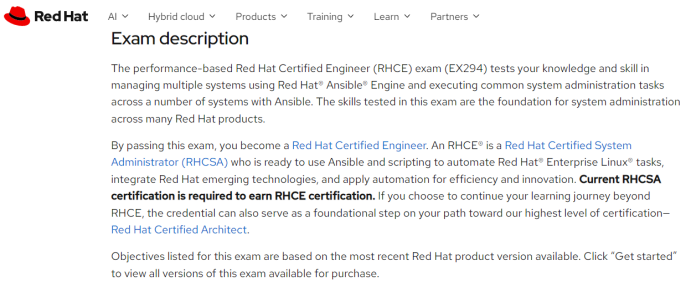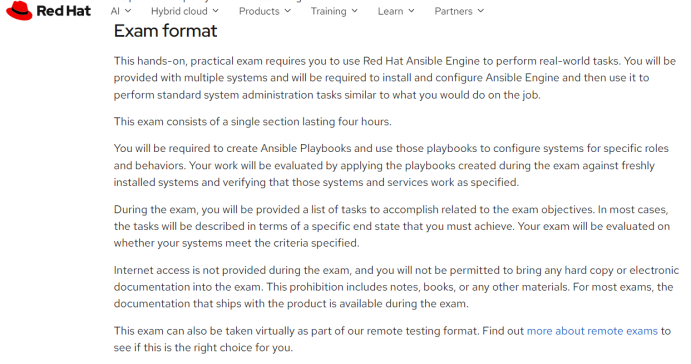A common question we hear is: “How many exams are required for RHCE? Can I skip the basics of Linux and jump straight in?”
As someone with years of technical experience, I’ll break down the RHCE exam rules, the topics you’ll face, and practical preparation strategies. This way, you’ll avoid the typical traps like “not knowing what to study” or “taking the long way around.”To make it easier, I’ve naturally included the key exam keywords throughout the article.

First, the core fact you need to know:
The current RHCE exam (based on RHEL 9) consists of just one comprehensive hands-on test. However, you must first master RHCSA (Red Hat Certified System Administrator) fundamentals.
Red Hat doesn’t officially require the RHCSA certificate before taking RHCE, but since the RHCE exam directly tests RHCSA-level operations, skipping the basics almost guarantees failure.
How many exams are there for RHCE?
Many people assume RHCE requires multiple exams. That used to be the case, but since 2020 Red Hat has simplified the structure. RHCE is now a single exam (exam code EX294).

• It’s 100% practical (no multiple choice)
• Done on a real RHEL system in the exam lab
• Focused on real-world Linux administration and automation skills
But here’s the catch: around 30%–40% of RHCE content overlaps with RHCSA basics — such as partitioning, user management, service deployment. Without mastering RHCSA-level tasks (exam code EX200), you’ll struggle with even simple steps like “partitioning a disk” or “restarting a service and checking logs.”
So think of it this way: You study the content of two exams (RHCSA + RHCE), but you only sit one actual test (RHCE).
RHCE Exam Format & Key Content
Exam Format:
• Type: On-site, hands-on only
• Duration: 4 hours
• Tasks: 15–20 practical problems
• Passing Score: 80/100
All operations must be performed manually in a live RHEL environment — no internet, no reference material, no shortcuts.
Exam Content (Two Key Parts):
1. Fundamentals (30–40%) – Your safety net
• Disk partitioning, LVM setup, filesystem mounting
• User/group/permission management (including SUID/SGID, sudo)
• Service deployment (Apache/Nginx), firewall rules, SELinux configuration
These are RHCSA-level topics, easy to secure full points if you’ve practiced them well.
2. Advanced Operations (60–70%) – The scoring focus
• Ansible automation: Writing Playbooks, Roles, variables, templates
• Shell scripting: Log rotation, monitoring scripts with error handling
• High availability & containers: Keepalived setup, Podman container management
Most candidates find Ansible the toughest section — it requires extensive hands-on practice with syntax, modules, and real-world automation tasks.

Four Practical Tips for Passing RHCE (with Dumps)
1. Master RHCSA first — don’t skip basics
Even if you know some Linux, make sure you’ve fully covered RHCSA exam topics. Instead of relying on generic tutorials, focus on EX200-style practice questions from trusted dumps. This ensures your skills align with the actual exam.
2. Practice with hands-on labs, not rote memorization
RHCE isn’t about reciting commands, but about solving problems. For example, with Ansible, it’s not about memorizing every Playbook line but about knowing which modules and variables to use for a real deployment task.
Use dumps with lab-style tasks to simulate real exam scenarios.
3. Focus on core exam topics — don’t waste time elsewhere
Stick to the official exam objectives. Ansible, scripting, and HA/containers are the high-value areas. Use focused dumps to drill these repeatedly. Don’t waste time on things like kernel compilation or advanced Python, which aren’t tested.
4. Use updated exam dumps — avoid unreliable sources
Instead of random “tips” online, rely on verified RHCE dumps aligned with RHEL 9. They’ll help you practice the exact exam format and save you from last-minute surprises.
Final Thoughts
The RHCE isn’t an “entry-level certificate” — it’s a proof of enterprise-grade Linux administration skills. Passing it shows you can handle automation and infrastructure management for real-world companies.
Preparation takes commitment — usually 1–2 months of focused practice. Don’t expect to cram in a week. If your goal is Linux or automation engineering, RHCE is absolutely worth it. If you’re just starting out, begin with RHCSA, then decide whether to move up.
And remember: use structured dumps to prepare — not just scattered tutorials. That way, you’ll stay exam-focused and dramatically improve your pass rate.
I'm your man who have the 100% valid dumps , buy it now for 50% off to clear your exam!
Click it ↓↓



